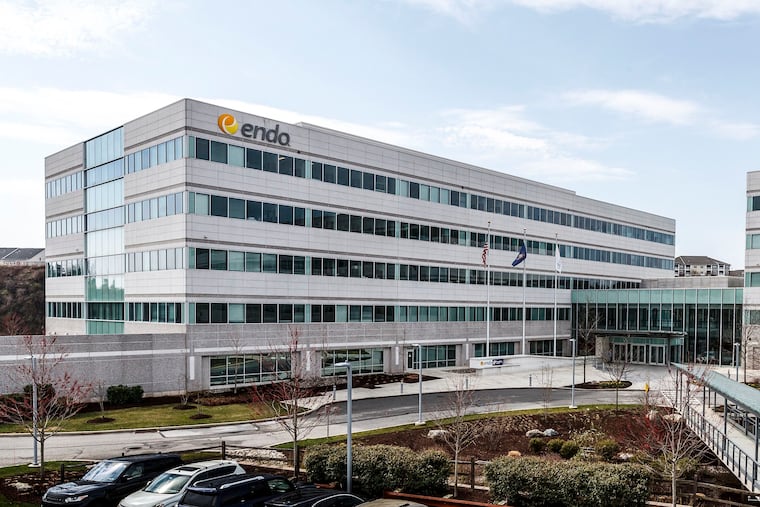Opioid-maker Endo $98 million bonuses are delayed in bankruptcy court
A bankruptcy judge on Thursday approved paying $93,000 in short-term incentives to employees and sales reps at Malvern’s Endo International.

A bankruptcy judge on Thursday approved paying $93,000 in short-term incentives to employees and sales reps at Malvern’s Endo International but delayed a broader decision on multimillion-dollar bonus packages for Endo’s rank-and-file staff.
Endo, one of the nation’s largest opioid makers, paid $94 million in bonuses to its top executives and insiders before it filed for bankruptcy in mid-August, bringing attention to it the corporation’s executive bonuses prior to the filing.
Endo has sought bankruptcy court approval for about $98 million in bonuses for Endo employees, and the company has told the court the money won’t go to top executives and corporate insiders — which is being evaluated by the U.S. trustee, a federal watchdog.
The trustee and a committee of opioid victims say the bonuses would drain Endo’s financial resources as it faces 3,100 opioid lawsuits.
Attorneys for the committee estimate there could be 600,000 victims of Endo’s opioid pain pills and say that Endo has set aside virtually nothing for them.
Endo, best known for Percocet, sold Opana for severe pain. The drug firm pulled Opana from the consumer market in 2017 because of the potential for abuse and addiction.
Former Tennessee Attorney General Herbert H. Slatery III claimed in a 2019 lawsuit that Endo was “substantially responsible for the opioid epidemic in Tennessee” when Opana pills flooded parts of the state.
Bankruptcy Judge James L. Garrity Jr. approved the $93,000 in incentives for Endo employees as the drug firm continues to operate and scheduled a hearing over the remaining issues on the bonuses for the rank-and-file employees for Nov. 10. Eighty attorneys attended Thursday’s 40-minute call-in hearing.
Critics of the bonuses have argued with the company over who should be designated as an Endo “insider” and whether they can claw back bonuses if it’s determined the individual participated in criminal activity involving opioids at Endo.
Susan Arbeit, an attorney for the U.S. trustee, said that the trustee could question Endo’s chief human resources officer, Tracy Basso, over how she classified insiders as it regarded paying bonuses. Basso described in a court filing characterizing about 1,500 employees in bands from those with the highest responsibility to those with the lowest, or chief executive officer to overtime eligible administrators, operators, and technicians. She identified 21 insiders.
On Aug. 16, Endo filed for bankruptcy protection with slightly more than $1 billion of cash and billions of dollars in debt.
A group of Endo lenders owed about $6 billion propose acquiring the drug firm in a “stalking-horse bid” in a bankruptcy auction, court documents say. They will bid for Endo what they are owed. Endo has a substantial drug portfolio with facilities in the United States and India. If successful, they will own the drug firm but without the legal liabilities of the opioid lawsuits.
To settle the opioid liability, Endo’s purchaser would create three trusts with about $550 million over a decade. The funds would be divided between states and government entities, private victims such as individuals and hospitals, and Native American tribes in this way: $450 million for states and government entities, $85 million for private victims, and $15 million for Native American tribes.
A group of state attorneys general have described the pre-bankruptcy bonuses to Endo executives in court documents as “secret” and “excessive.”
A court filing by opioid victims, officially the Committee of Opioid Claimants, says the average nonexecutive Endo employee will receive 31 times more in bonus payments than the current restructuring proposal provides to private opioid claimants.
On Thursday, Garrity also approved the sale of an Endo facility in Chestnut Ridge, N.Y., for $19 million.
This story has been updated to clarify that the bonuses under discussion in bankruptcy court would go to rank-and-file workers.